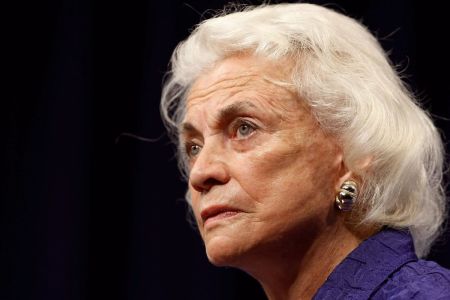Sandra Day O’Connor, first female Supreme Court justice, dies at 93

Former U.S. Supreme Court Justice Sandra Day O'Connor, the first woman to sit on the high court bench and served for 25 years, died at the age of 93 on Friday.
The Supreme Court announced she died this morning in Phoenix, Arizona, as a result of complications from advanced dementia and a respiratory sickness.
Supreme Court Chief Justice John Roberts said that O'Connor "blazed a historic trail as our Nation's first female Justice."
"She met that challenge with undaunted determination, indisputable ability, and engaging candor," stated Roberts. "We at the Supreme Court mourn the loss of a beloved colleague, a fiercely independent defender of the rule of law, and an eloquent advocate for civics education. And we celebrate her enduring legacy as a true public servant and patriot."
A native of El Paso, Texas, O'Connor was born in 1930 and married John Jay O'Connor III in 1952, earning multiple degrees from Stanford University before serving on the Maricopa County Superior Court and then the Arizona Court of Appeals.
O'Connor was nominated to the Supreme Court by Republican President Ronald Reagan and served on the high court from 1981 until her retirement in 2006, being awarded the Presidential Medal of Freedom in 2009 by Democrat President Barack Obama.
During her time on the Supreme Court, O'Connor was considered a moderate swing vote who often supported pro-choice policies.
In 2003, O'Connor authored the majority opinion in the case of Grutter v. Bollinger, in which the Supreme Court narrowly upheld a University of Michigan Law School policy that used race as a factor in admissions.
O'Connor wrote in her opinion that "race-conscious admissions policies must be limited in time" and predicted that "25 years from now, the use of racial preferences will no longer be necessary to further the interest approved today."
O'Connor's statement about when the need for racial preferences might expire was a major point in the case of Students for Fair Admissions, Inc. v. President and Fellows of Harvard College. The ruling handed down in June concluded that colleges and universities could not use race as a factor in admissions.
"University programs must comply with strict scrutiny, they may never use race as a stereotype or negative, and — at some point — they must end," wrote Roberts, alluding to O'Connor's words.
"Respondents' admissions systems — however well intentioned and implemented in good faith — fail each of these criteria. They must therefore be invalidated under the Equal Protection Clause of the Fourteenth Amendment."
In addition to her legal work, O'Connor authored five books: Lazy B: Growing Up on a Cattle Ranch in the American Southwest (2002), The Majesty of the Law: Reflections of a Supreme Court Justice (2002), Chico (2005), Finding Susie (2009) and Out of Order: Stories from the History of the Supreme Court (2013).
In 2018, O'Connor announced that she had dementia, the same disease that her late husband had been afflicted with and retired from public life.
"I hope that I have inspired young people about civic engagement and helped pave the pathway for women who may have faced obstacles pursuing their careers," she wrote at the time.
"My greatest thanks to our nation, to my family, to my former colleagues, and to all the wonderful people I have had the opportunity to engage with over the years."
Funeral details are pending.






















